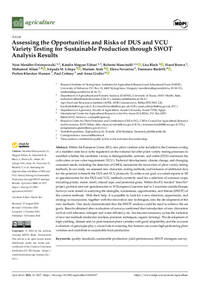Assessing the Opportunities and Risks of DUS and VCU Variety Testing for Sustainable Production through SWOT Analysis Results

Authors:
Within the European Union (EU), new plant varieties to be included in the Common catalog of a member state have to be registered on the national list after plant variety testing processes to establish whether the candidate variety is distinguishable, uniform, and stable (DUS) and meets the cultivation or use value requirement (VCU). Technical development, climate change, and changing consumer needs, including the detection of GMOs, necessitate the innovation of plant variety testing methods. In our study, we assessed new characters, testing methods, and inclusion of additional data for the potential to benefit the DUS and VCU protocols. To achieve our goal, we asked experts to fill in questionnaires for the DUS and VCU methods currently used for a selection of common crops, including potato, maize, lentil, oilseed rape, and perennial grass. Within the EU-funded “InnoVar” project, partners sent out questionnaires to 19 European Countries and to 3 countries outside Europe. Surveys were aimed at analyzing the strengths, weaknesses, opportunities, and threats (SWOT) of the current methods. With their help, it is possible to look for a new direction, opportunity, and strategy to incorporate, together with the innovative new techniques, into the development of the new methods. Our study demonstrated that the SWOT analysis could be used to achieve the set goals. Results obtained after evaluation of surveys confirmed that introduction of new characters such as cold tolerance, nitrogen and water efficiency, etc. has become necessary, as has the inclusion of new test methods (molecular markers, precision techniques, organic farming). The development of high-yielding, disease and/or pest-resistant plant varieties with good adaptability and the accurate evaluation of genotypes play a crucial role in ensuring that farmers can access high-performing plant varieties and contribute to sustainable food production.
